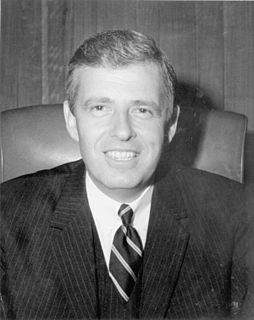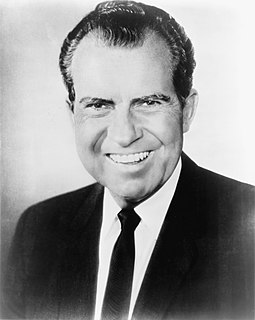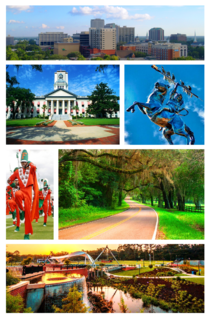
Claude Roy Kirk Jr. was the 36th Governor of the U.S. state of Florida (1967–1971). He was the first Republican Governor of Florida since Reconstruction.

The 1964 United States Senate elections coincided with the election of President Lyndon B. Johnson by an overwhelming majority, to a full term. His Democratic Party picked up a net two seats from the Republicans. As of 2019, this is the last time either party has had a two-thirds majority in the Senate, which would have hypothetically allowed the Senate Democrats to override a veto, convict and expel certain officials, or invoke cloture without any votes from Republicans. The Senate election coincided with Democratic gains in the House in the same year.

The 2006 California gubernatorial election occurred on November 7, 2006. The primary elections took place on June 6, 2006. The incumbent Republican Governor, Arnold Schwarzenegger, won re-election for his first and only full term. His main opponent was California State Treasurer Phil Angelides, the California Democratic Party nominee. Peter Camejo was the California Green Party nominee, Janice Jordan was the Peace and Freedom Party nominee, Art Olivier was the California Libertarian Party nominee, and Edward C. Noonan was the California American Independent Party nominee.

United States gubernatorial elections were held Tuesday, November 4, 2008 in 11 states and two territories. Prior to the election, eight of the total seats were held by Democrats and five by Republicans. Two governors were prohibited by term limits from seeking re-election in 2008.
North Carolina elections to choose members of the Council of State were held November 4, 2008. This coincided with the presidential, U.S. Senate, U.S. House, gubernatorial, and statewide judicial elections.

United States gubernatorial elections were held on November 2, 2010 in 37 states and two territories. As in most midterm elections, the party controlling the White House lost ground. Democrats did take five governorships from the Republicans, and Republicans took 11 governorships from the Democrats. An independent won one governorship previously held by a Republican. A Republican won one governorship previously held by an independent. Republicans held a majority of governorships for the first time since before the 2006 elections. One state, Louisiana, had no election for governor, but did feature a special election for lieutenant governor.

Louis Arthur "Skip" Bafalis is a retired American politician who served as a Republican member of the United States House of Representatives from Florida's 10th congressional district.

United States gubernatorial elections were held on November 3, 2009 in the states of New Jersey and Virginia as well as in the U.S. commonwealth of the Northern Mariana Islands on November 7, 2009. Both state governorships were previously held by Democrats elected in 2005, and as a result of the 2009 elections both are presently held by Republicans; the local Covenant Party maintained control of the governorship of the Marianas. These elections formed part of the 2009 United States elections.

On November 7, 2006, New York, along with the rest of the country held elections for the United States House of Representatives. Democrats picked up 3 House seats, the 19th, the 20th, and the 24th.

The Florida gubernatorial election of 1970 took place on November 3, 1970, to determine the Governor and Lieutenant Governor of Florida, concurrent with the election to the United States Senate, elections to the United States House of Representatives, and various state and local elections.

The Arkansas gubernatorial election of November 8, 1966 was the first time since Reconstruction that a member of the Republican Party was elected governor.

The 1986 Alabama gubernatorial election saw the election of Republican H. Guy Hunt over Democrat Bill Baxley. In state politics, this election is largely seen as a realigning election since Hunt was the first Republican to be elected Governor since Reconstruction. In March 1986, incumbent George Wallace announced that he would not seek a fifth term as governor, ending an era in Alabama politics.

The 2010 Illinois gubernatorial election took place on November 2, 2010. Incumbent Democratic Governor Pat Quinn sought and was elected to a full term in office. Quinn was elected as the Democratic nominee, the Illinois Green Party nominee was attorney and 2006 nominee Rich Whitney, the Republican nominee was State Senator Bill Brady, the Libertarian Party nominee was Lex Green, and Scott Lee Cohen ran as an independent. Governor Quinn won election to a full term in a very close race, beating Senator Brady by only about 32,000 votes, despite Brady winning in 98 of 102 Illinois counties.

The 1970 Maine gubernatorial election took place on November 3, 1970. Incumbent Democratic Governor of Maine Kenneth M. Curtis chose to seek re-election. Curtis won a landslide victory in the Democratic primary. His general election opponent was Maine Attorney General James Erwin, the Republican nominee. Erwin had also easily won his respective party primary and received the Republican nomination for governor. Curtis narrowly defeated challenger in one of the tightest elections in Maine history – the final margin of victory was a mere 890 votes. Curtis received 163,138 votes (50.14%), while Erwin had 162,248 votes (49.86%).

The 2014 Texas gubernatorial election was held on November 4, 2014 to elect the Governor of Texas. Incumbent Republican Governor Rick Perry, who had served since the resignation of then-Governor George W. Bush on December 21, 2000, declined to run for an unprecedented fourth full term, making this the first open election for governor since 1990.

The Alabama gubernatorial election of 1966 took place on November 8, 1966, and saw the election of Lurleen Wallace as Governor over U.S. Representative James D. Martin. Incumbent Democrat George Wallace was term limited and could not seek a second consecutive term.

United States gubernatorial elections were held on November 6, 2018 in 36 states and three territories. These elections formed part of the 2018 United States elections. Other coinciding elections were the 2018 United States Senate elections and the 2018 United States House of Representatives elections. The last regular gubernatorial elections for all but three of the states took place in 2014. Governors in New Hampshire and Vermont serve two-year terms, meaning that their most recent gubernatorial elections took place in 2016. Meanwhile, Oregon held a special election in 2016 to fill an unexpired term.

The 1968 United States presidential election in Florida was held on November 5, 1968. Florida voters chose fourteen electors, or representatives to the Electoral College, who voted for president and vice president.




























